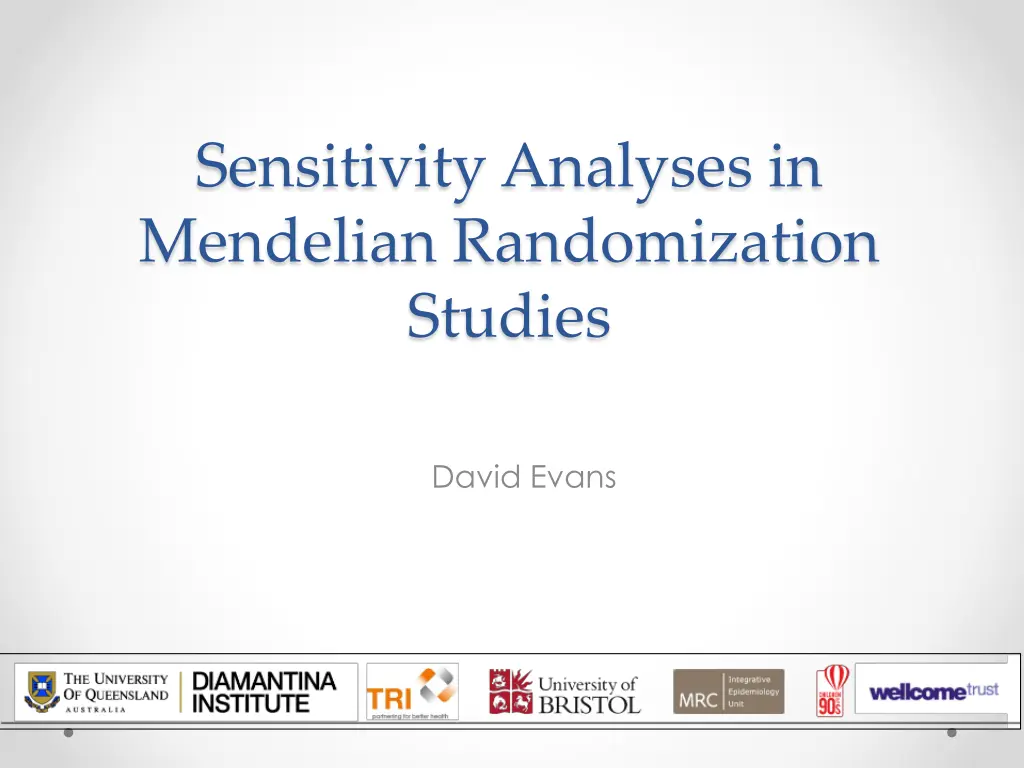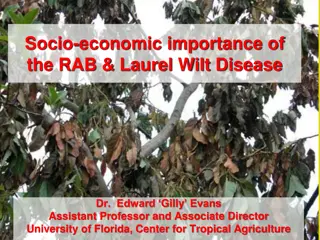
Understanding Challenges in Mendelian Randomization Studies
Mendelian Randomization (MR) studies face challenges due to the use of numerous genetic variants from GWAS, increasing power but raising the risk of pleiotropy. Pleiotropic variants can bias causal estimates and lead to false positives, impacting the validity of results.
Download Presentation

Please find below an Image/Link to download the presentation.
The content on the website is provided AS IS for your information and personal use only. It may not be sold, licensed, or shared on other websites without obtaining consent from the author. If you encounter any issues during the download, it is possible that the publisher has removed the file from their server.
You are allowed to download the files provided on this website for personal or commercial use, subject to the condition that they are used lawfully. All files are the property of their respective owners.
The content on the website is provided AS IS for your information and personal use only. It may not be sold, licensed, or shared on other websites without obtaining consent from the author.
E N D
Presentation Transcript
Sensitivity Analyses in Mendelian Randomization Studies David Evans
This Session Inverse variance weighted MR Heterogeneity tests Multivariable MR MR Egger MR Weighted Median
Inverse Variance Weighted Fixed Effects Meta-analysis
Inverse variance weighted (IVW) fixed effects method There is one underlying true effect All deviations of sample effects from the true effect are due to chance 1 = iw ^ var( ) i N = i ^ ( * ) w 1 = i i se ^ pooled = 1 pooled N = i N ( ) w = i ( ) w i i 1 1 For N studies, each study i contributes more to the meta analysis if its standard error is lower
Calculate p-value N N = i ^ = i ^ * w 2 ( * ) w ^ ^ 2 i i i i pooled se = = 1 z pooled se = = 2 1 = 1 df 2 N N = i = i pooled w w pooled i i 1 1
Fixed Effects IVW-MR and Weighted Linear regression MR Test Inverse variance weighted 0.3 IVW is equivalent to a weighted regression of SNP-outcome effects on SNP-exposure effects passing through the origin SNP effect on Coronary heart disease || id:7 0.2 The weights are 1/SE_SNP_outcome The slope is the estimate of the causal effect 0.1 Confounders SNP 1 SNP 2 SNP 3 SNP 4 0.0 LDL CHD 0.0 0.1 0.2 0.3 0.4 0.5 SNP effect on LDL cholesterol || id:300
LDL and CHD Risk Ference et al, JACC 2012
MR methods for handling horizontal pleiotropy Many methods now exist
What is the problem? Mendelian Randomization (MR) uses genetic variants to test for causal relationships between phenotypic exposures and disease-related outcomes Due to the proliferation of GWAS, it is increasingly common for MR analyses to use large numbers of genetic variants Increased power but greater potential for pleiotropy Pleiotropic variants affect biological pathways other than the exposure under investigation and therefore can lead to biased causal estimates and false positives under the null
Two Sample MR: Single Variants Wald = Beta-GY Beta-GX Causal estimate using Wald method:
Two Sample MR: Multiple Variants Causal estimate using IVW from summarised data: (Approximates TSLS)
MR with direct pleiotropy . Single variant Wald estimate: Multiple variant TSLS / IVW :
Heterogeneity We expect that each SNP represents an independent study, and each should give an unbiased (if imprecise) estimate of the causal effect of x on y Heterogeneity, where effect estimates are more different than expected due to standard errors, arises because at least some of the instruments are invalid Cochran s Q statistic n=6 instruments Expect Q = 5 if there is no heterogeneity Q is chi-square distributed with n-1 degrees of freedom
Option 1: Remove outliers Some SNPs might contribute to the majority of the heterogeneity If we assume these are the invalid instruments then the IVW estimate excluding them should be less biased However beware of: Cherry picking remove outliers will artificially provide a more precise estimate What if the outlier is the only valid instrument, and all the others are invalid? o E.g. cis-variants for gene expression, DNA methylation, protein levels. CRP levels are best instrumented by variants within the CRP gene region. Most other variants that come up in CRP GWAS are upstream effects related to inflammation
Option 2: Multivariable MR We are testing for whether X1 has an influence on Y We know that some instruments for X1 also have influences on X2 This opens up the possibility of horizontal pleiotropy biasing our estimate What is the X1-Y association adjusting for X2?
Option 3: Fit a model that is robust to some model of horizontal pleiotropy
MR Egger Regression: Central concept In Mendelian Randomization when multiple genetic variants are being used as IVs, Egger regression can: o Identify the presence of directional pleiotropy (biasing the IV estimate) o provide a less biased causal estimate (in the presence of pleiotropy)
InSIDE Assumption Relaxing MR s assumptions . W
Example: ALL INVALID INSTRUMENTS INSIDE ASSUMPTION SATISFIED SNP outcome association SNP exposure association
InSIDE: Bias of ratio estimator SNP outcome association SNP exposure association
Egger regression: Intercept not constrained to zero Egger s test assesses whether the intercept term is significantly different from zero. The estimated values of the intercept can be interpreted as the average pleiotropic effect across all genetic variants. An intercept term different from zero indicates directional pleiotropy
Height and lung function SNP-Lung Function SNP-Height SNP - Height Causal estimate IVW = 0.59 (95% CI: 0.50, 0.67 ) Egger = 0.58 (95% CI: 0.50, 0.67); intercept -0.001 p=0.5
BP and Coronary Disease FUNNEL PLOTS Visual evidence for asymmetry
BP and Coronary Disease FUNNEL PLOTS
BP and Coronary Disease Scatter Plots Egger test for intercept p=0.054 Egger test for intercept p=0.2
BP and Coronary Disease FUNNEL PLOTS IVW= 0.083 logOR/mmHg p=1x10-5 Egger =-0.024 logOR/mmHg p=0.7 IVW= 0.054 logOR/mmHg p=4x10-6 Egger =0.015 logOR/mmHg p=0.6
Simple Median Method Order instrumental variables estimates and take the median Like all subsequent estimators it enjoys a 50% breakdown limit
Weighted Median Method ^ j2 2Yj wj jwj ___ ____ wj = wj =
Penalized Weighted Median Method Although the invalid IVs do not contribute directly to the median estimate, they do influence it in small samples Like all subsequent estimators it enjoys a 50% breakdown limit
Penalized Weighted Median Method One way of minimizing this problem is down-weighting the contribution to the analysis of genetic variants with heterogeneous ratio estimates Heterogeneity between estimates can be quantified by Cochrane s Q statistic: ^ ^ Q = jQj = jwj ( j - )2 The Q statistic has a chi-squared distribution on J 1 degrees of freedom under the null hypothesis of no heterogeneity Each individual component of Q has a chi-square distribution with 1 df. Bowden proposes using a one sided upper P value (denoted qj): wj* = w j min(1, 20qj)
Penalized Weighted Median Method
Summary MR uses natural randomization to mimic an RCT It is useful, data is abundant, but it is not a panacea for causal inference Often valuable for proving that an hypothesised association is not causal Crucial to perform sensitivity analyses and obtain metrics regarding the likely reliability of the MR estimates
References Bowden et al. Detecting individual and global horizontal pleiotropy in Mendelian randomization: a job for the humble heterogeneity statistic? American Journal of Epidemiology 2018, 187(12), 2681-2685. Bowden et al. Consistent estimation in Mendelian randomization with some invalid instruments using a weighted median estimator Genet Epidemiol 40(4), 304-14 Bowden et al. Mendelian randomization with invalid instruments: effect estimation and bias through Egger regression. Int J Epidemiol, 44(2), 512- 25 Burgess et al. Multivariable Mendelian randomization: the use of pleiotropic genetic variants to estimate causal effects. Am J Epidemiol, 181(4), 251-60 Hemani et al. Evaluating the potential role of pleiotropy in Mendelian randomization studies Human Molecular Genetics, Volume 27, Issue R2, 1 August 2018, Pages R195 R208






















